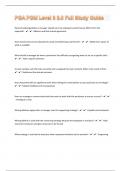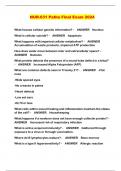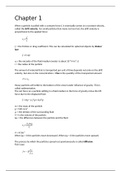Ethics of Ryanair
Regarding the competitive position of the firm, Porter (1985) identified three different generic
strategies which are implemented by companies (cost leadership, differentiation and focus). For
instance, a firm which wants to be the cheapest in the industry will tend to opt for a cost
leadership strategy (Porter, 1985). This strategy mainly focuses on financial outcomes, however
Dyer & Reeves (1995) and Van de Voorde, Paauwe and van Veldhoven (2012) argue that when
doing so, the employee outcomes (e.g. satisfaction, well-being) should also be taken into
account. Additionally, the critical view of HRM criticizes the ethical foundations of HRM, for
instance when organizations only focus on pursuing economic goals, neglect employee well-
being and do not consider the interests of various stakeholders involved (Greenwood, 2002).
In this paper it is argued that firms which adopt the cost leadership strategy can still be profitable
while implementing ethical HR practices. Based on the contextual strategic HRM (SHRM)
framework and ethical theories in HRM, this paper will make recommendations for Ryanair,
which is notorious for disregarding employee interests (Gittell & Bamber, 2010).
A context based approach towards HRM
HRM is defined as a system of activities and strategies that focuses on successfully managing
employees to achieve organizational goals (Byars & Rue, 2006). The contextual SHRM
framework assumes that HR consists of two interlinked sides, the context and SHRM side. The
context exists of competitive, institutional and heritage mechanisms, which influence legitimacy
and organizational capabilities, while the SHRM side focuses on organizational performance and
employee well-being (Paauwe & Farndale, 2017). The model thus stresses the indirect influence
of legitimacy on organizational performance and employee well-being (Paauwe & Farndale,
2017). This emphasizes the importance of legitimacy in firms. Moreover, Rendtorff (2009)
reasons that legitimacy and ethics are closely related. Therefore, it is not surprising that
Winstanley and Woodall (2000) point out that ethical considerations regarding HRM should not
be overlooked.
Greenwood (2002) argues that there are two different ethical approaches in HRM: the
mainstream and critical perspective of HRM. This paper focuses on the critical perspective, since
it reflects on HRM as a controlling and manipulative tool to make sure that employees will
sacrifice everything for the organization, regardless of their own needs (Greenwood, 2002).
, Furthermore, it assumes that HRM has little focus on the development and well-being of
employees (Greenwood, 2002). Additionally, the critical view assumes that it is important to
acknowledge that various stakeholders have different views and goals that need to be considered.
(Greenwood, 2002).
This is in line with the stakeholder theory of Freeman (1984) who defines stakeholders as those
who affect or are affected by organizational decision making. Moreover, the stakeholder theory
suggests that businesses should not focus on benefiting just their shareholders, however strive to
balance benefits between multiple stakeholders (Wijnberg, 2000). Besides, stakeholders can be
viewed as either instrumental (means to an end) or normative (moral view) (Greenwood, 2002).
This paper will focus on normative stakeholder theory (NST) as it is closely related to business
ethics and especially corporate social responsibility (CSR) (Bonnafous-Boucher & Rendtroff,
2016). NST reinforces organizations, who adopt its approach, to think beyond economic
perceptions and think of their society (Laplume, Sonpar, & Litz, 2008). Additionally, the focus
on different stakeholders within their society enables organizations to increase their CSR (Jones
& Nisbet, 2011) and positively impact their corporate legitimacy (Laplume, Sonpar & Litz,
2008). Furthermore, NST theorizes that employees are legitimate stakeholders as well
(Bonnafous-Boucher & Rendtorff, 2016). They stress that involvement and acceptability of all
stakeholders within an organization is crucial, since the viability of organizational systems
depends on it (Simmons, 2008). According to Greenwood (2002), stakeholders should be treated
fairly and not be used solely as a means to accomplish organizational goals. However,
Winstanley & Woodall (2000) found that ethical considerations regarding the employees are
often overlooked.
According to Schumann (2001), there are five complementary moral principles, which can be
used to make ethical judgments within HRM. One organization reported to be ignoring ethical
considerations is Ryanair, which is a well-known low-cost airline (Gittell & Bamber, 2010). By
using the five moral principles of Schumann (2001), this paper highlights the ethical issues
within the HR strategy of Ryanair. The first principle, Utilitarianism considers an action ethical
based upon the outcome the action produces (Winstanley & Woodall, 2000). The outcome of the
action should be the most beneficial and least damaging for everyone involved (Schumann,
2001). Looking at Ryanair the shareholders are interested in the reduction of costs (O’Connell &
Williams, 2005). However, this is at the expense of employees as the focus is more on distal
Regarding the competitive position of the firm, Porter (1985) identified three different generic
strategies which are implemented by companies (cost leadership, differentiation and focus). For
instance, a firm which wants to be the cheapest in the industry will tend to opt for a cost
leadership strategy (Porter, 1985). This strategy mainly focuses on financial outcomes, however
Dyer & Reeves (1995) and Van de Voorde, Paauwe and van Veldhoven (2012) argue that when
doing so, the employee outcomes (e.g. satisfaction, well-being) should also be taken into
account. Additionally, the critical view of HRM criticizes the ethical foundations of HRM, for
instance when organizations only focus on pursuing economic goals, neglect employee well-
being and do not consider the interests of various stakeholders involved (Greenwood, 2002).
In this paper it is argued that firms which adopt the cost leadership strategy can still be profitable
while implementing ethical HR practices. Based on the contextual strategic HRM (SHRM)
framework and ethical theories in HRM, this paper will make recommendations for Ryanair,
which is notorious for disregarding employee interests (Gittell & Bamber, 2010).
A context based approach towards HRM
HRM is defined as a system of activities and strategies that focuses on successfully managing
employees to achieve organizational goals (Byars & Rue, 2006). The contextual SHRM
framework assumes that HR consists of two interlinked sides, the context and SHRM side. The
context exists of competitive, institutional and heritage mechanisms, which influence legitimacy
and organizational capabilities, while the SHRM side focuses on organizational performance and
employee well-being (Paauwe & Farndale, 2017). The model thus stresses the indirect influence
of legitimacy on organizational performance and employee well-being (Paauwe & Farndale,
2017). This emphasizes the importance of legitimacy in firms. Moreover, Rendtorff (2009)
reasons that legitimacy and ethics are closely related. Therefore, it is not surprising that
Winstanley and Woodall (2000) point out that ethical considerations regarding HRM should not
be overlooked.
Greenwood (2002) argues that there are two different ethical approaches in HRM: the
mainstream and critical perspective of HRM. This paper focuses on the critical perspective, since
it reflects on HRM as a controlling and manipulative tool to make sure that employees will
sacrifice everything for the organization, regardless of their own needs (Greenwood, 2002).
, Furthermore, it assumes that HRM has little focus on the development and well-being of
employees (Greenwood, 2002). Additionally, the critical view assumes that it is important to
acknowledge that various stakeholders have different views and goals that need to be considered.
(Greenwood, 2002).
This is in line with the stakeholder theory of Freeman (1984) who defines stakeholders as those
who affect or are affected by organizational decision making. Moreover, the stakeholder theory
suggests that businesses should not focus on benefiting just their shareholders, however strive to
balance benefits between multiple stakeholders (Wijnberg, 2000). Besides, stakeholders can be
viewed as either instrumental (means to an end) or normative (moral view) (Greenwood, 2002).
This paper will focus on normative stakeholder theory (NST) as it is closely related to business
ethics and especially corporate social responsibility (CSR) (Bonnafous-Boucher & Rendtroff,
2016). NST reinforces organizations, who adopt its approach, to think beyond economic
perceptions and think of their society (Laplume, Sonpar, & Litz, 2008). Additionally, the focus
on different stakeholders within their society enables organizations to increase their CSR (Jones
& Nisbet, 2011) and positively impact their corporate legitimacy (Laplume, Sonpar & Litz,
2008). Furthermore, NST theorizes that employees are legitimate stakeholders as well
(Bonnafous-Boucher & Rendtorff, 2016). They stress that involvement and acceptability of all
stakeholders within an organization is crucial, since the viability of organizational systems
depends on it (Simmons, 2008). According to Greenwood (2002), stakeholders should be treated
fairly and not be used solely as a means to accomplish organizational goals. However,
Winstanley & Woodall (2000) found that ethical considerations regarding the employees are
often overlooked.
According to Schumann (2001), there are five complementary moral principles, which can be
used to make ethical judgments within HRM. One organization reported to be ignoring ethical
considerations is Ryanair, which is a well-known low-cost airline (Gittell & Bamber, 2010). By
using the five moral principles of Schumann (2001), this paper highlights the ethical issues
within the HR strategy of Ryanair. The first principle, Utilitarianism considers an action ethical
based upon the outcome the action produces (Winstanley & Woodall, 2000). The outcome of the
action should be the most beneficial and least damaging for everyone involved (Schumann,
2001). Looking at Ryanair the shareholders are interested in the reduction of costs (O’Connell &
Williams, 2005). However, this is at the expense of employees as the focus is more on distal







